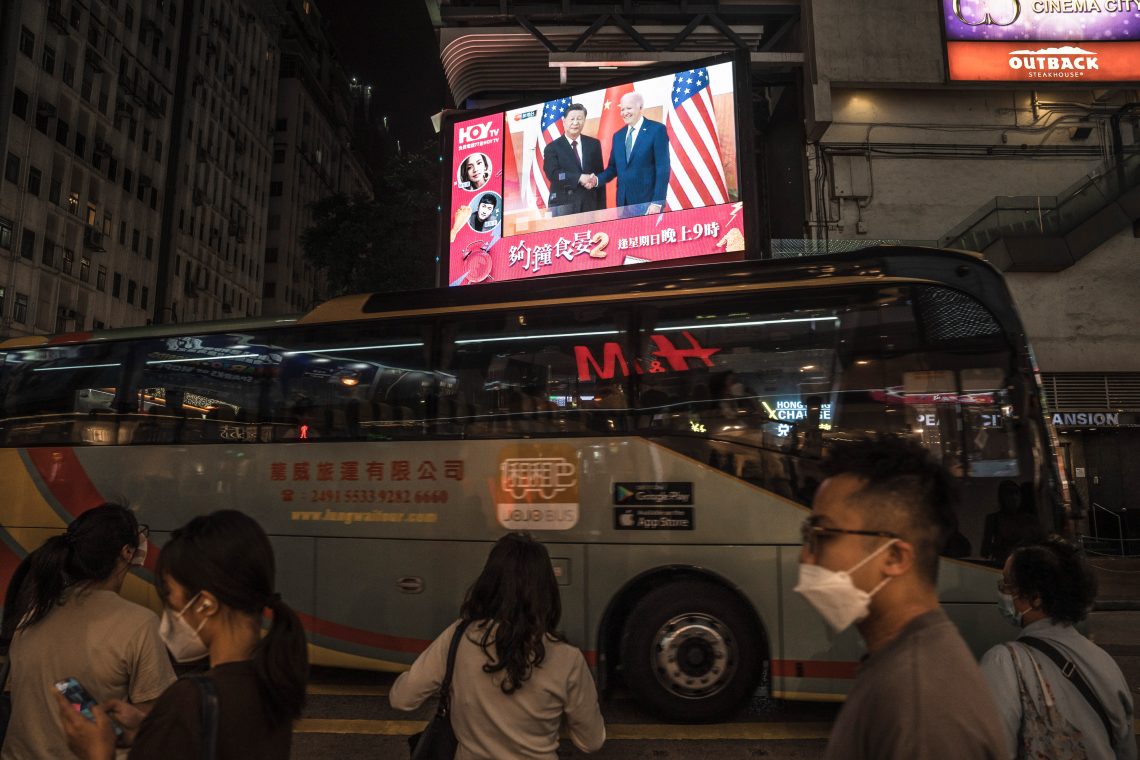A shift is taking place in U.S.-China relations
Despite the surveillance balloon scandal, President Xi Jinping has two compelling reasons to curb his hostility to the West: the economy and Russia’s faltering war in Ukraine.

In a nutshell
- The U.S. and Chinese presidents set the stage for less conflict in a November meeting
- Russia and Taiwan remain wild cards that could decide the future of bilateral relations
- The balloon incident has complicated President Xi’s focus on improving the economy
A three-hour meeting between Chinese Vice Premier Liu He and United States Treasury Secretary Janet Yellen on the sidelines of the World Economic Forum in Davos was remarkable for its length and amicable nature. It was another sign that a less combative turn is in the offing for Sino-U.S. relations, a subtle shift that will reverberate globally.
The thaw that began with the November meeting of Presidents Xi Jinping and Joe Biden in Bali will likely continue. While the recent brazen intrusion of a surveillance balloon over U.S. territory reminded America of China’s untrustworthiness, better relations are likely to happen for one overriding reason: Due to economic woes, President Xi has decided he needs to “make peace” – at least for now – with the U.S.
The circumstances for a bilateral turnabout after a long period of heightened tension need to be examined.
It is instructive to recall President Xi’s initial vision of the world when he first came to power in 2013. The ambitious Mr. Xi had his heart set on catching up with the U.S. and was confident that his nation could do so by leveraging its technological and financial clout with the West, especially the U.S.
President Xi envisions China and the U.S. becoming the two giants who regulate the world. He saw a new type of great power relationship with the U.S. – one in which China takes a larger and more equal presence on the world stage. Russia was not at the forefront of Mr. Xi’s plans.
After seeing the amazing Ukrainian resistance coupled with Russian incompetence, the Chinese leadership hypocritically announced that Beijing would take a neutral stance.
Then-President Barack Obama, who served from 2009 to 2017, did not take kindly to his counterpart’s initiative because of Beijing’s penchant for stealing U.S. technologies and its flouting of promises made to the World Trade Organization. With the U.S. repeatedly rejecting Mr. Xi’s signals and overtures, he switched to his Plan B foreign policy: aligning more tightly with Russia.
President Donald Trump’s hardline China policy accelerated Mr. Xi’s shift to Plan B, with the Chinese leader becoming demonstrably more enthusiastic about Russian President Vladimir Putin. Although history shows that China-Russia relations are difficult, President Xi turned the bilateral situation around.
Read more by Junhua Zhang
Can the U.S. and Taiwan avoid a war with China?
Lessons from war and economic quagmire
The grinding and protracted war in Ukraine seems to be forcing President Xi to change his thinking about Russia. Chinese political elites initially had confidence that President Putin’s military would quickly achieve its military goals. It was this belief and partly a personal affinity between the two presidents that explains why China not only failed to condemn Russia, but also blamed NATO and the U.S. for the Kremlin’s aggression.
After seeing the amazing Ukrainian resistance and Russian incompetence, the Chinese leadership hypocritically announced that Beijing would take a neutral stance. But Mr. Xi still thought – and maybe still thinks – it would be better for Russia to win the war. Now, with a stalemated war and no end in sight, the situation is not looking good for the Kremlin leader. Aside from the West’s uninterrupted military aid to Ukraine, a recent shift in attitudes is taking place among three countries with which China has very close ties.
Serbia, Cambodia and Pakistan
One is Europe’s Serbia, whose President Aleksander Vucic recently opposed the recruitment of mercenaries by the Russian Wagner Group in Serbia, while at the same time explicitly stating that Russian-occupied Crimea and Donbas are Ukrainian territories, a move that left Chinese officials stumped. After all, Serbia is not only a good partner of China but also of Russia.
The second country is Cambodia. Not many countries in Southeast Asia openly support Ukraine, but Cambodia has taken on the task of training Ukrainian sappers for demining. Cambodia is one of China’s closest allies in the region, but it has broken ranks on this issue.
Then there is China’s “iron friend,” Pakistan, which was persuaded by the U.S. and Britain to provide Ukraine with ammunition. This is clearly a parting of ways with China’s friendly attitude toward Mr. Putin. China has always opposed arms shipments to Ukraine.
It is conceivable that there will be similar shifts among non-Western countries and perhaps more open opposition to Russia’s war. The performance of these three countries from the so-called Chinese camp, combined with the unflagging support of Western countries for Ukraine and the situation on the battlefield, is bound to increase pressure on President Xi to soften his “wolf warrior” diplomatic posture toward the West, above all the U.S.

Economy drives Beijing’s shift
The main factor that has prompted President Xi to readjust his stance is China’s current economic situation. China needs Western companies, including American ones, to stay in China, and more Western investment. Beijing is desperate to export more goods to the U.S. and Europe. There is also an unrealistic hope in Beijing that the U.S. will relax its curb on semiconductor chip exports and related manufacturing equipment. In short, China’s economic predicament has forced Mr. Xi to put his doctrine of a declining West and a rising China on hold for now. He needs a detente in Sino-U.S. relations.
U.S. China policy
U.S.-China relations are shifting for the better not only because of cordial meetings such as the ones between Presidents Xi and Biden in Indonesia and Mr. Liu and Ms. Yellen in Switzerland earlier this year.
The U.S. does not want to push China completely toward Russia. A Xi-Putin alliance is not only detrimental to an early end to the war in Ukraine, but also to America’s broader interests. While Beijing has greatly increased trade with Russia since the war – to a record $190 billion in 2022, the figure is dwarfed by $691 billion in China-U.S. trade last year.
The U.S. recognizes that China does not provide substantial military support to Russia, unlike Iran and North Korea. But it could go further. The U.S. is trying to prevent China from providing Russia with substantial assistance in the decisive months ahead, beyond the light equipment – such as bulletproof vests, dual-use drones and chips for weapons – that Beijing has already provided Moscow. The U.S. wants Ukraine to make visible progress by summer. Otherwise, more Republicans may resist the Biden administration’s support for Kyiv. A prolonged war also could harm the U.S. president’s reelection chances in 2024.
China and the U.S. have set the tone for bilateral relations that are unlikely to deteriorate this year.
The U.S. is also working hard to keep the status quo in Taiwan, which China views as a renegade region that must be brought under Beijing’s control even by military means if necessary. Washington wants to avoid an armed conflict.
Also, after taking a harsh stance against transfers of advanced technology to China, the U.S. seeks cooperation on other issues, such as finance, climate change and food security.
The interests of China and the U.S. make it easier to understand why Secretary Yellen gladly accepted Mr. Liu’s invitation to visit Beijing. The two nations’ interests also make it likely that U.S. Secretary of State Antony Blinken will go ahead with his original plan to visit Beijing. In order to demonstrate his sincerity, President Xi has even arranged a dinner with him.
Unfortunately, the Chinese president turned out to be a leader who is not fully capable of coordinating his diplomacy with the activities of the military. It is obvious that China’s military sticks to its own schedule without taking Mr. Blinken’s visit into account. China’s asynchronous sectors have led to this semi-crisis.
In addition, both Mr. Xi and Mr. Biden are facing their own internal challenges. While President Xi has to demonstrate toughness to please China’s radical nationalist hawks, mainly in the military, President Biden has to contend with the Republicans who are now a slight majority in the House of Representatives. His rivals are determined to make the Biden administration look awkward so that it will lose the 2024 election. Biden’s internal challengers are much more powerful than Mr. Xi’s.
The semi-crisis means that hope remains for the planned easing of the relationship between the U.S. and China. But it looks like both leaders must demonstrate their toughness when it comes to national security and the reputation of the country. Behind the scenes, however, Ms. Yellen’s visit will take place as planned. Also, on February 17, Mr. Blinken and China’s former foreign minister will meet each other in Munich to explore the possibility of resuming the U.S. secretary of state’s meeting with Mr. Xi.
Scenarios
Regardless of the balloon incident, China and the U.S. have set the tone for bilateral relations that are unlikely to deteriorate this year. After President Biden issued a ban on exports of advanced chips and manufacturing equipment to China last October, the U.S. worried about retaliation from Beijing. Such retaliation has not occurred. Interdependence keeps both sides searching for cooperation possibilities. Beijing’s need for more from the U.S. has prompted Mr. Xi to acquiesce on the chip issue and look for nonconfrontational ways to mitigate the ban.
Even if a bilateral improvement in relations is a stopgap measure, it still brings benefits. Mr. Xi’s more conciliatory approach could have a positive effect on the global economy and bring a quicker end to the war in Ukraine. While the People’s Liberation Army remains aggressive regarding Taiwan, war is less likely now because the economy is more important to President Xi, at least this year.
The question is whether this temporary detente will hold. Two factors will play a decisive role. One is whether President Xi will abandon his ambition to resolve the Taiwan issue during his third term. So far, everything he does is in preparation to bring the issue to a head and to bring Taiwan to heel. Preparation is taking place not only on the military side, but also on the economic one as well. For example, President Xi commissioned a Chinese think tank to assess the potential harm of Western sanctions in the event of an invasion of Taiwan.
If the U.S. succeeds in making Beijing hesitate, then the Taiwan factor will be temporarily marginalized. But if the U.S. fails, then the danger increases of escalating conflicts between the U.S. and China.
Another factor is the uncertain outcome of the war in Ukraine. Russia will have presidential elections next year, which may give Mr. Putin the impetus to bring the conflict to an end in 2023. If the war ends with Ukraine achieving its goal of liberating all its territory from Russian control, U.S.-China relations would be strengthened as Moscow falls further out of favor in Beijing. But if Russia prevails, bolstering an anti-Western axis, President Xi will have fewer reasons to ease U.S.-China relations. In this sense, the American president is eager for his secretary of state to meet the Chinese leader before Mr. Xi visits Moscow in spring. In the end, President Xi’s role in the Ukraine war cannot be ignored.







